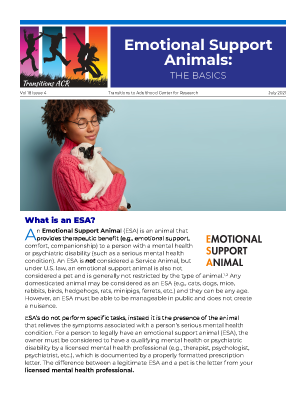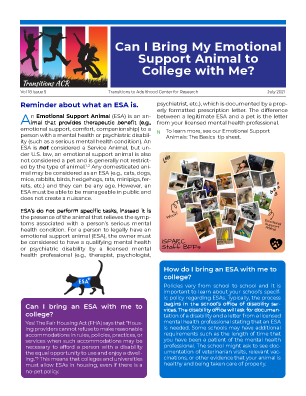Policy, Program, & Other Supports
Tip Sheets and Issue Briefs
-
martes, julio 20, 2021
![""]()
Emotional Support Animals: The Basics
By: Anwyn Gatesy-Davis
-
martes, julio 20, 2021
![""]()
Can I Bring My Emotional Support Animal to College with Me?
By: Anwyn Gatesy-Davis
-
lunes, agosto 31, 2020
![""]()
-
lunes, junio 22, 2020
![""]()
-
viernes, septiembre 06, 2019
![""]()
-
miércoles, octubre 31, 2018
![""]()
Strategies for Engaging Young Adults
By: Deirdre G. Logan, Michelle G. Mullen
-
martes, septiembre 25, 2018
![""]()
Tips and Tricks to Starting a Young Adult Council Part 2: The Do’s and Don’ts of Young Adult Councils
By: Raphael Mizrahi, Amanda Costa
-
martes, septiembre 25, 2018
![""]()
Tips and Tricks to Starting a Young Adult Council Part 1: 10 Steps to Starting a Young Adult Advisory Council
By: Raphael Mizrahi, Amanda Costa
-
jueves, febrero 01, 2018
![""]()
Testing Whether Multisystemic Therapy for Emerging Adults Can Reduce Their Justice System Involvement
By: Bernadette Shaw, Michael Peters, Deirdre G. Logan, Ashli Sheidow, Maryann Davis
-
domingo, octubre 01, 2017
![""]()
Transition-Age Youth Psychotherapy Experiences (TYPE) Study
By: Amanda Costa, Emma Pici-D'Ottavio, Laura Golden, Maryann Davis










